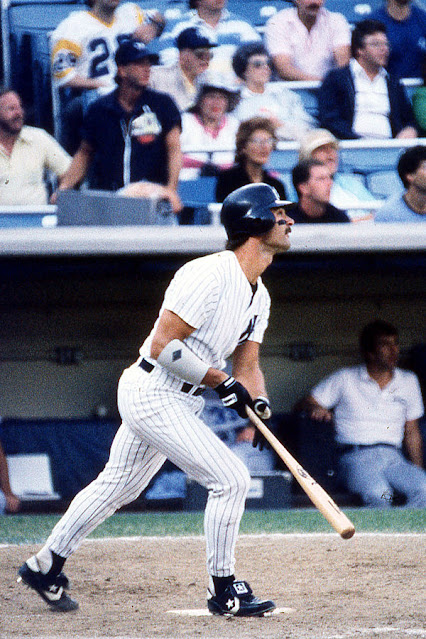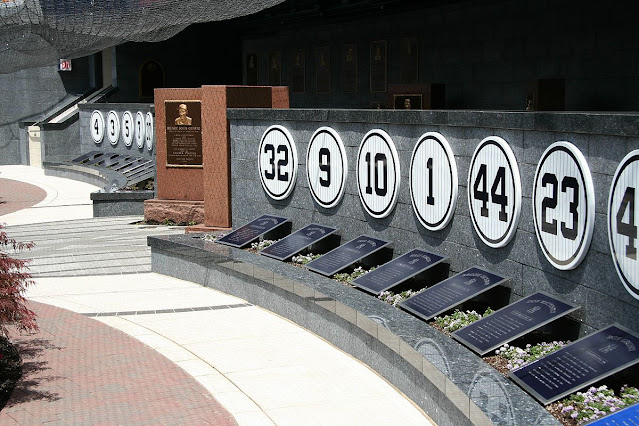Jimmy Sez Film Review: Donnie Baseball
It's impossible to overstate how much Don Mattingly meant to me when I was growing up. In second grade I had a homework assignment to write about my heroes and present it to my class. The two heroes I chose were my dad and Don Mattingly. A few years later the Yankees made the playoffs for the first time since I was born and the team was clearly rallying around Mattingly in what was likely his final season as a player. When things got tight late in the decisive Game 5 in Seattle, I ran to the bathroom during a commercial break and prayed like I never prayed before. Pleading to let a few bounces go the Yankees way so that Donnie could finally play in the World Series. Spoiler alert: he didn't.
In my late teens I spent many hours applying to colleges, most of them requiring essays. The topic of the majority of my essays was Don Mattingly. What he taught me about leadership, work ethic, and the two-way street called respect, even though we had never spoken a word to each other. I was accepted by all the colleges that were forced to read my Mattingly raves. Later still, I somehow found myself writing a book about the all-time greatest Yankees. Naturally, Mattingly would be included, but I found the section on him to be one of the hardest to write. When given the opportunity to write a mini-biography on your childhood hero for the world to read, limiting it to just a few pages felt like jail.
I'm not alone in my admiration for The Hit Man. Any Yankee fan born between, let's say, 1974 and 1984 likely points to Mattingly as their favorite player growing up and a hero of sorts. That's why the MLB Network decided to produce Donnie Baseball, the latest installment of their documentary series, which premiered on Sunday night. Since I've spent most of my life writing about Mattingly, I figure it only makes sense to offer up a formal review of the film.
In Donnie Baseball's opening monologue, the point is made that with Mattingly his greatness was not so much about what you see, but what you feel. Respectfully, I disagree. To an objective observer that saw him play for even a half inning, it was obvious that he was a great baseball player. What you saw with Mattingly was the type of player that coaches dream of. He rarely made mistakes, he played hard and with purpose, and as Suzyn Waldman would point out later in the film, he looked like the very definition of a 1980's baseball player. The eye black, the moustache, the impossibly smooth swing that only lefties seem to have. His greatness didn't require some deeper understanding that only those inside baseball get, it was plain as day. Thankfully, they never really drive this point home and it just kind of dissipates after the opening.
The meat of the documentary is a fairly straightforward biography and recap of Mattingly's playing career. The storytellers are the man himself as well as a host of former teammates, managers, and media members who covered his career. The most interesting inclusion, though, was George Brett. We'll get to him later.
The themes of Mattingly's career - and really what make him great in the first place - are established right away and the filmmakers did a great job of carrying them through the duration. He was quiet and humble, but thanks to a relentless work ethic didn't lack confidence and was well respected wherever he went. That all ties back to his blue collar upbringing in the modest confines of Evansville, IN where he starred in multiple sports throughout high school. It's clear that in his mind, Mattingly never left Evansville. In fact he was scared of playing in a big city like New York at first and never really got used to it. Considering how his contemporaries fared in New York during the 80's, he was probably better off not diving into the city head first.
After establishing that Mattingly willed himself with quiet confidence into Yogi Berra's crowded Yankee lineup, the film breezes through the mid-1980's, when he was at his peak and had a legitimate claim to being the best player in baseball. They hit the vital highlights of this period such as his batting title in 1984, his MVP in 1985, and the home run streak and grand slam records he set in 1987. The statistical nugget that he was twice as likely to double or homer than strike out from 1984 through 1986 was a nice touch too, but this felt like a missed opportunity. It would have been great to hear from Willie Randolph - his partner on the right side of the infield - or better yet some pitchers he faced frequently to hear what they had to say about him during his glory years.
Instead the film's focus quickly jumps to Mattingly's back injuries, which hung like a black cloud over the second half of his career. Ironically, the unparalleled work ethic that fueled his greatness was his undoing. Mattingly speaks with some regret about how his obsession with batting practice wore his body down quickly and robbed him of his power. It also set the stage for one of the better sequences in the film, detailing a spat with Yankee ownership around his contract that got out of hand in a hurry.
Mattingly opens up about how furious he was with George Steinbrenner for making headlines by saying his star player was concerned only with personal records as his play deteriorated. He even began to stir up trade rumors as he made contract negotiations public. For Mattingly, it came down to respect, and he didn't back down from The Boss until he treated him with the respect he had clearly earned. He came out of the spat with Steinbrenner with a contract extension, global support from the baseball community, and the peace of mind that he successfully punched the loud bully in the nose.
The next chapter in Mattingly's career is mostly told through the words of Buck Showalter and Bernie Williams. Even as his play declined, they make it clear that his value to the team never did. What the Yankees really needed during this time was a leader to guide them through a major rebuild, and Mattingly was the perfect candidate. Williams noted that his work ethic was infectious with the impressionable young players on the team. He also supported Williams through his early struggles - both personal and professional - in a way that drew no attention. Quietly, confidently, and with no fanfare.
Showalter took it a step further. When he came on board as manager, he needed to get rid of all the bad influences on the team. In order to do that, he relied heavily on Mattingly who had more influence on the team than anyone else in the organization. Within two years, the Yankees were contenders again and in 1994 they were the best team in the American League.
When the World Series was cancelled due to the strike, most pointed to Mattingly as the player most affected. With his injuries worsening, he noted that the strike was probably the only reason he came back in 1995. The film really shines when detailing the 1995 payoff run.
It's made clear that everyone within baseball was rooting hard for Mattingly to get his chance in October. He even recalls telling Showalter that down the stretch he was going to pull out all the stops and play as hard as he could for as long as he could, injuries be damned. He did just that, hitting around .350 while the team rallied around him to win the newly formed Wild Card spot.
The crescendo of Donnie Baseball is the interviewees reliving Mattingly's home run in Game 2 of the ALDS at Yankee Stadium mixed with the actual game footage. A packed house erupted when their hero came through in the clutch in what was to be his final home game. It was a moment of catharsis for Mattingly, and a moment of mayhem for the crowd. Showalter recalled getting out of the dugout because he thought it was going to collapse. Joel Sherman of the New York Post was convinced that the entire stadium was moving during the celebration.
That elation didn't last long as the Yankees would quickly squander the series in Seattle despite Mattingly remaining red hot. Those present at the time recall that every player was in tears with the exception of Mattingly, who faced reporters with a calm ease knowing he left everything on the field and spoke to each player individually on the flight home.
Most of those interviewed speak regretfully about how the Yankees enjoyed a ton of success with four World Series wins right after Mattingly retired. George Brett even makes the point that had he hung on a few more years, he would be a lock for the Hall of Fame. Mattingly was less regretful, and noted that while he wished he could have been there, he wouldn't trade it for the time he spent with his kids after retirement.
In his only display of emotion during the film, Mattingly then talks about the positive influence his dad was on his life. He simply showed up and let him play, without criticism or undue praise, and that instilled in him the fearless confidence he played with his whole career. To honor his dad, he wanted to be that same type of father for his sons. I'd say he succeeded, as two of his boys went on to become professional baseball players.
Mattingly's final comments in the film underscore his humility and get us back to George Brett's surprising role in all of this. His lack of Hall of Fame support doesn't bother him at all because he feels like he wasn't as good as he should have been. Had he not beaten his body up so much early in his career, he likely would have accomplished much more.
What mattered more to Mattingly than the Hall of Fame was being respected within the game. He specifically called out earning the respect of a player like George Brett as his main goal. Throughout the film not only did Brett make it clear that he thinks Mattingly was every bit as good as him as a player, but also that if he had to share a foxhole with someone, it would be Don Mattingly. Mission accomplished.
Donnie Baseball paints a clear and vivid picture of what made Don Mattingly stand out among his baseball peers during his career. Much like the man himself, it does so without pretension. It's a must-watch for even a casual baseball fan. And if you have anybody in your life wondering why you obsess over a baseball player from the 80's who never even played in a World Series, it's a perfect way to get them on board.
Or better yet, if you don't have 90 minutes to spare, you can offer up this perfect quote from Bernie Williams at the end of the film. It's applicable to both baseball and life, and concisely sums up Donnie way better than this meandering review did:
"In his mind he was playing for something bigger than himself, carrying himself with dignity, and character and integrity. You wanna play this game, but you don't wanna just pass through, you wanna make a mark on the game, and he certainly did."



.jpg)


Comments
Post a Comment